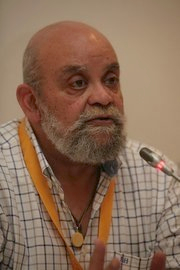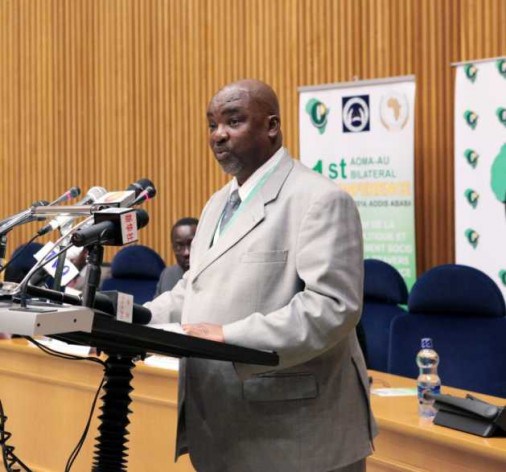By Baher Kamal*
In an interview with IPS on the eve of the WHS, the Head of Humanitarian Affairs, Refugees, and Displaced Persons Division at the AU Commission, Olabisi Dare said:
“All the key concerns that the AU will be raising at the World Humanitarian Summit is that there is a need for the redefinition of the international humanitarian system; this redefinition should take the form of a reconfiguration of the system.”
The Nigerian career diplomat and international civil servant with over 27 years international field and desk experience in Asia, Africa, Europe and America, added that the requested redefinition “should take the form of a reconfiguration of the system, it being understood that the existing system which is predicated on the UN Resolution 46 182 is to say the least not being faithfully implemented.”
It is therefore in this context that the African Union is going to Istanbul with its own commitments to itself, that is its own commitment to the continent and its people and one of the key things of this commitment is to anchor on the primacy of the states itself, “the State has the primary responsibility to its own people to satisfy their needs and to take care of their vulnerabilities,” said Olabisi.
“We look at these in several forms:
- The African Union feels the State has to play the primary role of coordinating any and all humanitarian action that may take place within its territory; the States have in their efforts to alleviate the needs of its people; the States have also to maintain humanitarian space and have a responsibility to guarantee the safety of both the humanitarian workers and humanitarian infrastructure.
- We note that the State has the capability and capacity in key areas like use of military assets in assisting humanitarian action–a key example is the use of military forces in Liberia and other acted countries the military was deployed to serve as the first line of defense to combat the spread of the disease.
That said, Olabisi remarked “We can’t over-emphasise the role of the State in ensuring that humanitarian action and relief is dispensed in an effective manner and we see that this in itself will effect humanitarian action more readily on the continent.”
“Africa however is resolved to begin addressing its own problems using African solutions to African problems.“ – Olabisi Dare, Head of Humanitarian Affairs, Refugees, and Displaced Persons Division at the AU Commission
Asked what are the African needed solutions that the AUC brings to the WHS, Olabisi, who was also senior Political/Humanitarian Affairs Officer at the African Union Mission in Liberia, with extensive experience in various aspects peace-building in a post conflict environment, including serving on the Technical Support Team to the Truth and Reconciliation Commission of Liberia, reaffirmed “The African Union will make proposals in terms of what it considers as the reconfiguration of the International Humanitarian systems.”
“Part of the solution is that there is a need for governments to play the primary role and a greater coordination role in order to fulfill the attributes of state in terms of its predictive and responsive nature and other attributes and this in itself is as part of what Africa has committed to do and if this find its way to the Secretary General’s report as part of the recommendation, this would be very good.”
Olabisi, who was involved in the return and rehabilitation programme of over 300,000 Liberian refugees from across the West Africa sub-region, added “We are also going to call for the re-engineering of resolution 46182 Strengthening of the coordination of humanitarian emergency assistance of the United Nations to reflect Africa’s views, to reflect the need to elevate the role of the state primarily to be to deliver to its people.”
The Resolution 46182 that Olabisi refers to, was adopted in 1991, setting as “Guiding Principles” that humanitarian assistance is of cardinal importance for the victims of natural disasters and other emergencies and must be provided in accordance with the principles of humanity, neutrality and impartiality.
Guiding Principle 3 clearly states, “The sovereignty, territorial integrity and national unity of States must be fully respected in accordance with the Charter of the United Nations. In this context, humanitarian assistance should be provided with the consent of the affected country and in principle on the basis of an appeal by the affected country.”
“Each State has the responsibility first and foremost to take care of the victims of natural disasters and other emergencies occurring on its territory. Hence, the affected State has the primary role in the initiation, organization, coordination, and implementation of humanitarian assistance within its territory,” states also the Guiding Principle 4.
And Guiding Principle 9 stresses, “There is a clear relationship between emergency, rehabilitation and development. In order to ensure a smooth transition from relief to rehabilitation and development, emergency assistance should be provided in ways that will be supportive of recovery and long-term development. Thus, emergency measures should be seen as a step towards long-term development.”

For its part, Guiding Principle 10 stresses, “Economic growth and sustainable development are essential for prevention of and preparedness against natural disasters and other emergencies. Many emergencies reflect the underlying crisis in development facing developing countries.
“Humanitarian assistance should therefore be accompanied by a renewal of commitment to economic growth and sustainable development of developing countries,” it adds. ”In this context, adequate resources must be made available to address their development problems.”
“Contributions for humanitarian assistance should be provided in a way which is not to the detriment of resources made available for international cooperation for development,” says Guiding Principle 11.
Obalisi then recalled “When you look at the Common African Position (CAP) [on the post 2015 development agenda], you find that the first pillar speaks to the privacy of the state; all the other 9 pillar speak the same in one form or another.”
Africa will be calling on itself to be able to deliver more on resources and allocate more resources to humanitarian action, he added. “This is because it is mindful of the fact that the resource portals are dwindling from the north.”
Asked what are the outcomes that Africa would most expect from the WHS, Olabisi said that Africa expects the guarantee that international humanitarian system will be reconfigured to conform with new demands and address the issues faced by the humanitarian system at the moment – one of the main outcome the Summit will deliver.
“Africa is making these commitments to itself-due to the non-binding nature of the summit. The commitments Africa has made go beyond the WHS whether the summit is binding or not it will not affect what Africa is committed to, in its own self-interest and this is one of the key recommendations we will be taking to WHS.”
He stressed that Africa’s commitments are not to the WHS but the Summit “gives us an opportunity to discuss a paradigm shift in terms of the way we do things in the humanitarian field in Africa and also to see that we can positively add to the mitigation and alleviation of the sufferings of our people when disasters and displacements occur.”
“One of the key things to note is that Africa will go ahead with its own commitments, “our resolve to come up with something that is workable, pragmatic, and something that will make us see ourselves in a light that puts us in a position to help ourselves despite the grand bargain on Africa being shut out of the whole system,” Olabisi emphasised.
“Africa however is resolved to begin addressing its own problems using African solutions to African problems.”
*Baher Kamal’s report was published in IPS. Go to Original.
 *Baher Kamal, Egyptian-born, Spanish-national secular journalist. He is founder and publisher of Human Wrongs Watch.Kamal is a pro-peace, non-violence, human rights, coexistence defender, with more than 45 years of professional experience.
*Baher Kamal, Egyptian-born, Spanish-national secular journalist. He is founder and publisher of Human Wrongs Watch.Kamal is a pro-peace, non-violence, human rights, coexistence defender, with more than 45 years of professional experience.Baher Kamal is also Senior Advisor to the Director General of international news agency IPS on Africa and the Middle East.
More articles by Baher Kamal in Human Wrongs Watch:
‘We Cannot Keep Jumping from Crisis to Crisis’
‘Human Suffering Has Reached Staggering Levels’
Now 1 in 2 World’s Refugees Live in Urban Areas
Middle East – The Mother of All Humanitarian Crises
Mideast: 1 in 3 Pays Bribe to Access Basic Public Services
Climate: Africa’s Human Existence at Severe Risk
No Water in the Kingdom of the Two Seas – Nor Elsewhere
Will the Middle East Become ‘Uninhabitable’?
Can an Animal Heist Fable Help Solve the Middle East Crisis?
A “Colombian Triangle” for Daesh in Libya?
‘Take My Iraqis and Give Me Some Syrians’ – Europe to Turkey
New Nuclear Hysteria in the Middle East
Africa Launches Largest Trading Block with 620 Million Consumers
Big War Lords Playing Brinkmanship Game in Syria
Cameron at large: Want Not to Become a Terrorist? Speak Fluent English!
Women’s Rights First – African Summit
Africa, Only If It Bleeds It Leads?
Seven Top Challenges Facing African Women
Once Auctioned, What to Do with the ‘Stock’ of Syrian Refugees?
Silence, Please! A New Middle East Is in the Making
The Over-Written, Under-Reported Middle East (II): 99.5 Years of (Imposed) Solitude
The Over-Written, Under-Reported Middle East (I): Of Arabs and Muslims
Egypt in the Rear Mirror (I): The Irresistible Temptation to Analyse What One Ignores
Egypt in the Rear Mirror (II): Who Are the Not-So-Invisible Powers Behind the Troglodytes?
Fed Up With Empty Promises, The Arabs May Abandon Nuclear Non-Proliferation Treaty
Anti-Nukes Move from Norway to Bahrain
Middle East Nuclear Free Bid Moves to Finland – Yet Another Lost Chance?
Annual Spending on Nuclear Weapons, Equivalent To UN Budget For 45 Years
Watch The Sky–It May Rain Atomic Bombs
Save The Planet? Just Eat Cars, Drink Fuel!
Who Is Afraid of 300 Or 400 Or 500 Million Miserables?
Violence And Death For Millions Of Life-Givers
Whither Egypt (I) – Did You Say Dictatorship?
Whither Egypt (II) – Economic Bankruptcy
Politicians Promote Fossil Fuels with Half a Trillion Dollars a Year
Who Dares to Challenge a 32 Billion Dollars Business – Human Trafficking?
Palestine: Yet Another One Hundred Years of Solitude
Does Anyone Know Anything About A New Country Called South Sudan?
South Sudan: Yet Another Kitchen-Garden?
Somalia? Which Somalia? Some Facts About Everybody’s — Nobody’s Land
Requiem For Palestine (I): A Conflict Born With A Solution
Requiem For Palestine (II): Can Gruyere Be A Solution?
The Mediterranean Sea Is Sick, Very Sick










